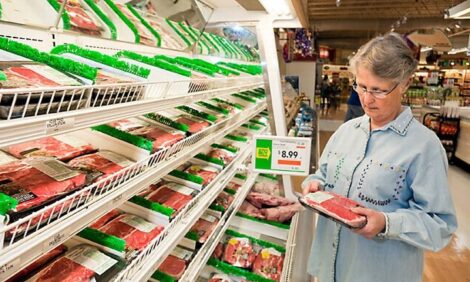



Beijing, Fearing Unrest, Moves to Curb Sharp Rise in Food Prices
CHINA - Steep food prices have pushed inflation in China to its highest level in a decade this summer, causing hardship for millions of low-income families. Worried that anger about rising prices could lead to political unrest, Beijing has taken a number of measures to control inflation. Claudia Blume reports from VOA's Asia News Center in Hong Kong. |
| A pork vendor waits for customers at a market in Chengdu of China's Sichuan province. |
Grocery shopping has become a lot more expensive for Chinese consumers.
In July, food prices went up more than 15 percent from a year earlier. Meat prices alone jumped almost 50 percent compared with the same month a year earlier.
The main reason for the increase: supply shortages, caused by severe flooding in parts of China and a disease that killed millions of pigs over the past year. Pork is one of China's top sources of protein.
In Hong Kong, where most staple food items are imported from mainland China, grocery shoppers are also feeling the pinch.
Sixty-one-year-old Mr. Chen sells meat and vegetables at a Hong Kong market. He says the prices for all items he sells have gone up. A half kilogram of pork, for example, now costs about $4, while a month ago it cost $3.50.
The steeper food prices pushed the overall inflation in China to 5.6 percent in July, the sharpest rise in a decade. But prices for non-food items rose more slowly, by less than one percent.
In the past, high inflation has led to political unrest in China, as it hits the poorest the hardest. Anger about rising prices was one of the factors that triggered massive pro-democracy protests in China in 1989.
The steep inflation this year comes at a sensitive time, shortly before the Communist Party congress in October.
Sun Mingchun, a senior economist in the Hong Kong office of the investment bank Lehman Brothers, says, "I think it's pretty sensitive because inflation affects everybody's life, especially those in the urban area, even in the rural area inflation is also rising because of rising pork prices. I think it's pretty sensitive and the government is trying to do a lot, tries to stabilize the inflation and also stabilize inflation expectation."
Sun says the government is trying to stabilize food prices by using food reserves and by giving subsidies to low-income households and farmers, encouraging them to raise more pigs, for example. Authorities also are investigating whether food producers colluded to push up prices.
Last week, the central bank raised interest rates for the fourth time this year - to help control inflation and reduce investment in some industries. Sun says the government wants to demonstrate it is taking action.
"If inflation keeps rising, the central bank sends a signal to the public that they are going to tighten the monetary policy if the inflation could not come down," he said.
Source: VOA news
Click here or further comment on food and inflation fears








